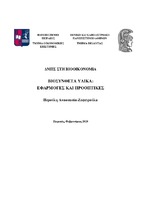Βιοσύνθετα υλικά: εφαρμογές και προοπτικές
Biocomposite materials: applications and prospects

Master Thesis
Συγγραφέας
Περούλη, Αναστασία - Ζαφειρούλα
Perouli, Anastasia - Zafeiroula
Ημερομηνία
2020-03Επιβλέπων
Γκόνου - Ζάγκου, ΖαχαρούλαΛέξεις κλειδιά
Βιοσύνθετα ; Βιοβασισμένα υλικά ; Φυτικές ίνες ; Ρητίνη ; Βιωσιμότητα ; Εφαρμογές ; Επιχειρηματικότητα ; Βιολογικοί πόροι ; Ελληνική αγροτική παραγωγήΠερίληψη
Με την κλιματική αλλαγή ολοένα και εμφανέστερη, το αγοραστικό κοινό
ευαισθητοποιείται ως προς τις καταναλωτικές του επιλογές. Από την άλλη η βιομηχανία
αντιμετωπίζει την αλλαγή των καταναλωτικών προτύπων, τη σπανιότητα πόρων που μέχρι
πρότινος θεωρούταν ανεξάντλητοι-πετρέλαιο, αλλά και μια σωρεία νομοθετικών ευρωπαϊκών
ρυθμίσεων που σκοπό έχουν να κατευθύνουν την παραγωγή σε πιο βιώσιμες επιλογές.
Απόρροια μιας τέτοιας προσπάθειας είναι και η εμφάνιση στην αγορά βιοβασισμένων ή
μερικώς βιοβασισμένων υλικών. Στην εργασία αυτή δίνεται στον αναγνώστη μια όσο το
δυνατόν πληρέστερη εικόνα για ένα μέρος των υλικών αυτών, τα βιοσύνθετα ή ενισχυμένα
πολυμερή.
Στο εισαγωγικό μέρος της εργασίας αναλύονται τα βιοσύνθετα υλικά και τα συστατικά
τους μέρη, βιώσιμες εναλλακτικές επιλογές που υπάρχουν διαθέσιμες στην αγορά, καθώς και
ενδιαφέρουσες τάσεις που εξετάζονται σε ακαδημαϊκό επίπεδο στον τομέα αυτό. Το ζήτημα
εξετάζεται υπό το πρίσμα μιας κριτικής σκοπιάς, δείχνοντας επίσης κάποιους
προβληματισμούς όσον αφορά στη συνολική βιωσιμότητα των υλικών αυτών. Πληροφορίες
αντλήθηκαν τόσο από ακαδημαϊκά άρθρα όσο και από ιστοσελίδες αφιερωμένες στα
βιοσύνθετα.
Στο κυρίως μέρος της εργασίας εισάγονται παραδείγματα επιχειρήσεων που
δραστηριοποιούνται στην ανάπτυξη βιοσύνθετων υλικών είτε στην ελληνική αγορά είτε στο
εξωτερικό. Για κάθε μια από τις επιχειρήσεις περιγράφονταιοι δραστηριότητες/προϊόντα της,
οι πόρους που αξιοποιεί για την παραγωγή της, το κοινό στο οποίο απευθύνεται, τα
ανταγωνιστικά της πλεονεκτήματα, καθώς και «συνταγές επιτυχίας» που αξίζουν να
σημειωθούν. Η ανάλυση δεν στρέφεται τόσο στα τεχνικά χαρακτηριστικά των προϊόντων
καθώς στόχος είναι να μελετηθούν τα στοιχεία εκείνα που καθιστούν τα βιοσύνθετα (και κατ’
επέκταση τις επιχειρήσεις) βιώσιμη επιλογή σε μια αγορά που κυριαρχούν συμβατικά,
φτηνότερα υποκατάστατα. Για την ανάλυση αυτή χρησιμοποιήθηκαν στοιχεία από τις
επίσημες ιστοσελίδες των επιχειρήσεων αυτών και η επιλογή κάθε επιχείρησης έγινε με βάση
ενδιαφέρουσες οπτικές προς ανάδειξη.
Στο τελευταίο κομμάτι της εργασίας συγκρίνονται η θεωρία του εισαγωγικού μέρους με τις
δυνατότητες της ελληνικής αγροτικής παραγωγής προκειμένου να προταθούν πιθανοί
ελληνικοί βιολογικοί πόροι προς αξιοποίηση στην κατεύθυνση βιομηχανικής αξιοποίησης
βιοσύνθετων υλικών. Με βάση τα παραδείγματα των επιχειρήσεων που αναφέρθηκαν στο
κυρίως μέρος θα γίνει μια σύγκριση όσον αφορά τα εμπόδια αλλά και τις ευκαιρίες που
προσφέρει η ελληνική πρωτογενής παραγωγή.


